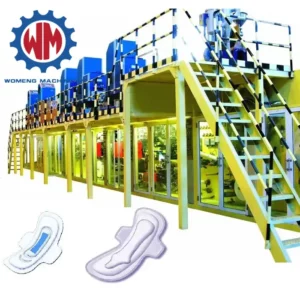Sanitary napkin machines for sale are highly customizable to meet specific production needs. Manufacturers offer a range of customization options to ensure that the machines can produce sanitary napkins tailored to the requirements of different markets, brands, and users.
Here are some ways in which these machines can be customized:
- Product Design: Sanitary napkin machines can be customized to produce various types of sanitary napkins, including ultra-thin, regular, overnight, panty liners, and maternity pads. Manufacturers can adjust the machine’s design and specifications to accommodate different sizes, shapes, and absorbency levels.
- Materials Compatibility: These machines can be designed to handle different types of materials, such as cotton, pulp, SAP (Super Absorbent Polymer), and non-woven fabrics. Manufacturers can customize the machine’s components, such as the feeding system and cutting mechanism, to work with specific materials.
- Production Capacity: Sanitary napkin machines come in various configurations with different production capacities to meet specific volume requirements. Manufacturers can customize the machine’s speed, output, and throughput capacity to match production needs, whether it’s for small-scale, medium-scale, or large-scale production.
- Automation Level: Depending on the budget and requirements, manufacturers can customize the level of automation of the sanitary napkin machine. sanitary napkin machine for sale Options range from semi-automatic machines, where some processes require manual intervention, to fully automatic machines with minimal human intervention.
- Quality Control Features: Customizable quality control features can be integrated into the machine to ensure consistent product quality. This may include sensors, cameras, and inspection systems for detecting defects, irregularities, and deviations from specifications during production.
- Packaging Options: Sanitary napkin machines can be customized to include packaging capabilities for individual napkins or multipacks. Manufacturers can configure the machine to package products in different formats, such as wrappers, bags, or boxes, according to specific packaging requirements.
- User Interface and Software: The machine’s user interface and software can be customized for ease of operation and monitoring. Manufacturers can provide intuitive control panels, touchscreen interfaces, and software with customizable settings for adjusting production parameters.
- Energy Efficiency and Sustainability: Customizable features for energy efficiency and sustainability can be incorporated into the machine’s design. This may include energy-saving components, waste reduction mechanisms, and options for using eco-friendly materials.
Overall, sanitary napkin machines for sale offer a high degree of customization to ensure that they can meet the unique production needs and specifications of manufacturers in the feminine hygiene industry. Manufacturers can work closely with suppliers to tailor the machine to their specific requirements and preferences.
How do sanitary napkin machine manufacturers in china handle variations in raw materials?
Sanitary napkin machine manufacturers in China handle variations in raw materials through a combination of flexibility in machine design, quality control measures, and collaboration with suppliers. Here’s how they typically manage variations in raw materials:
- Flexible Machine Design: Manufacturers design sanitary napkin machines with flexibility to accommodate a wide range of raw materials, including different types of absorbent cores, top sheets, back sheets, and packaging materials. Machines are equipped with adjustable settings and components to handle variations in material properties, such as thickness, weight, and composition.
- Material Compatibility Testing: Before production begins, manufacturers conduct extensive testing to evaluate the compatibility of different raw materials with the machine’s components and processes. This helps identify any potential issues or limitations and ensures that the machine can effectively handle variations in materials.
- Quality Control Systems: Sanitary napkin machines are equipped with quality control systems to monitor and maintain consistent material quality throughout the production process. This includes inspecting incoming raw materials for defects, deviations from specifications, and ensuring proper storage and handling to prevent contamination.
- Supplier Collaboration: Manufacturers collaborate closely with raw material suppliers to ensure a consistent supply of high-quality materials that meet the machine’s requirements. This may involve establishing long-term partnerships, sanitary napkin machine manufacturers in china specifying material specifications, and conducting regular audits and quality assessments of suppliers’ facilities.
- Adjustable Production Parameters: Sanitary napkin machines allow operators to adjust production parameters such as speed, temperature, pressure, and tension to optimize performance with different raw materials. This flexibility enables manufacturers to fine-tune machine settings to achieve optimal results with varying material characteristics.
- Material Waste Management: Manufacturers implement strategies to minimize material waste and maximize efficiency when handling variations in raw materials. This may include optimizing cutting patterns, recycling scrap material, and reusing or repurposing rejected or off-spec materials whenever possible.
- Continuous Improvement: Manufacturers continuously strive to improve their processes and technologies to better handle variations in raw materials. This may involve investing in research and development to develop new machine features, production techniques, or material innovations that enhance flexibility and adaptability.
By employing these strategies, sanitary napkin machine manufacturers in China can effectively handle variations in raw materials while maintaining consistent product quality, performance, and efficiency. This ensures that the machines can produce sanitary napkins that meet the diverse needs and preferences of consumers in the feminine hygiene market.
